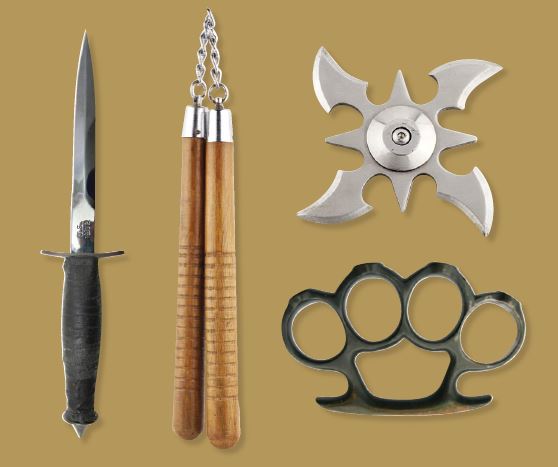Weapons
To Licensee:
California Penal Code prohibits manufacturing, selling, and/or possessing certain firearms, explosives, or other weapons absent very specific circumstances. Nunchaku (commonly known as “nunchucks”), brass knuckles, throwing stars and daggers, switchblades, gravity knives are just a few of the types of dangerous weapons that are included in this law. Please refer to the complete statute or related statutes for specific prohibitions.
B & P Code 23402.
Purchases by Retail Licenses
No retail on-sale or off-sale licensee, except a daily on-sale general licensee holding a license issued pursuant to Section 24045.1, (by the Alcoholic Beverage Control) shall purchase alcoholic beverages for resale from any person except a person holding a beer manufacturer’s, wine grower’s, rectifier’s, brandy manufacturer’s, or wholesaler’s license.
B & P Code 25607.
Unlawful Possession on Premises
a) Except as provided in subdivision (b), it is unlawful for any person or licensee to have upon any premises for which a license has been issued any alcoholic beverages other than the alcoholic beverage which the licensee is authorized to sell at the premises under his or her license. It shall be presumed that all alcoholic beverages found or located upon premises for which licenses have been issued belong to the person or persons to whom the licenses were issued. Every person violating the provisions of this section is guilty of a misdemeanor. The department may seize any alcoholic beverages found in violation of this section.
Penal Code 496. Stolen Property
a) Every person who buys or receives any property that has been stolen or that has been obtained in any manner constituting theft or extortion, knowing the property to be so stolen or obtained, or who conceals, sells, withholds, or aids in concealing, selling, or withholding any property from the owner, knowing the property to be so stolen or obtained, shall be punished by imprisonment in a state prison, or in a county jail for not more than one However, if the district attorney or the grand jury determines that this action would be in the interests of justice, the district attorney or the grand jury, as the case may be, may, if the value of the property does not exceed nine hundred fifty dollars ($950), specify in the accusatory pleading that the offense shall be a misdemeanor, punishable only by imprisonment in a county jail not exceeding one year. A principal in the actual theft of the property may be convicted pursuant to this section. However, no person may be convicted both pursuant to this section and of the theft of the same property.
b) Every swap meet vendor, as defined in Section 21661 of the Business and Professions Code, and every person whose principal business is dealing in, or collecting, merchandise or personal property, and every agent, employee, or representative of that person, who buys or receives any property of a value in excess of nine hundred fifty dollars ($950) that has been stolen or obtained in any manner constituting theft or extortion, under circumstances that should cause the person, agent, employee, or representative to make reasonable inquiry to ascertain that the person from whom the property was bought or received had the legal right to sell or deliver it, without making a reasonable inquiry, shall be punished by imprisonment in a state prison, or in a county jail for not more than one year. Every swap meet vendor, as defined in Section 21661 of the Business and Professions Code, and every person whose principal business is dealing in, or collecting, merchandise or personal property, and every agent, employee, or representative of that person, who buys or receives any property of a value of nine hundred fifty dollars ($950) or less that has been stolen or obtained in any manner constituting theft or extortion, under circumstances that should cause the person, agent, employee, or representative to make reasonable inquiry to ascertain that the person from whom the property was bought or received had the legal right to sell or deliver it, without making a reasonable inquiry, shall be guilty of a misdemeanor.
c) Any person who has been injured by a violation of subdivision (a) or (b) may bring an action for three times the amount of actual damages, if any, sustained by the plaintiff, costs of suit, and reasonable attorney’s fees.
d) Notwithstanding Section 664, any attempt to commit any act prohibited by this section, except an offense specified in the accusatory pleading as a misdemeanor, is punishable by imprisonment in the state prison, or in a county jail for not more than one year.
Contact
Additional information may be obtained by contacting:
Alcoholic Beverage Control
3927 Lennane Drive, Suite 100
Sacramento, CA 95834
Email us at headquarters@abc.ca.gov
Call (916) 419-2500




